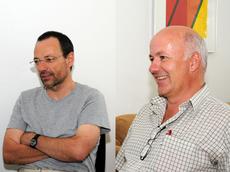Back to physicality
The student projects at ETH Zurich are becoming increasingly popular, and none more so than the focus projects. ETH Life spoke to their "inventors", professors Lino Guzzella and Roland Siegwart from the Department of Mechanical and Process Engineering.

Mechanical engineering is currently attracting an enormous intake of students. What role do the projects offered in your department play in this? I’m mainly talking about the very mediagenic focus projects, like the robot sailing boat “Avalon”, the flying film reel “Reely” and the hybrid racing car “Pegasus”.
Lino Guzzella: Of course, they are not directly correlated. It’s not as if you start offering focus projects and suddenly get twice as many students, but it certainly helps. Firstly, the visible presence of our department has noticeably increased as a result. Secondly, mechanical engineering addresses the central problems of the future; whether it be energy, food or the environment, we deal with all the hot topics that drive mankind. And thirdly, for years the industry has been complaining of a shortage of engineers, and young people have now reacted.
Yet project-oriented work is very important in your department.
Roland Siegwart: That’s correct. It begins as early as the second semester with the innovation projects, which are compulsory for everyone. The students learn to develop a product as a team; they have to make decisions and compare different concepts, which motivates them because they can create something. After all, that’s why they choose engineering in the first place. I think that it’s important for students to have the opportunity to do so at an early stage and we’re fortunate enough to have the sufficient means at ETH Zurich to offer such a program.
What’s next in store for the students?
Guzzella: In their fifth semester, they can choose between a subject- or project-oriented degree. Those who opt for the project-oriented approach have to find a topic, a team, a supervisor and sometimes sponsors, too. They then spend their fifth and especially their sixth semester working on a focus project with an integrated bachelor thesis.
Where do the ideas for the focus projects come from?
Siegwart: The students and us. In my experience, what works best is for us to put forward topics that we are interested in as rough ideas and the project participants can then incorporate their own ideas. Most of the topics used to come from industry. However, the knowledge advantage in the companies is usually so great that the concepts developed by the students are already known there, which is frustrating.
You said ‘used to’. How long have the focus projects existed?
Guzzella: Since 1996. Back then, we hit an all-time low in our department. We had no more than 170 students and the department’s reputation was modest to say the least, so the senior colleagues told us younger members of staff, “You can do whatever you want, but do something!” But that was easier said than done. Then we had a look round some other universities and more or less copied the student project idea. Markus Meier was in charge at the time.
What was the aim?
Guzzella: There are students who are content with a classical timetable and those who prefer creating things. That’s not to say that they don’t acquire theoretical skills – that was important for me from the outset – but they learn in a way that motivates them better: around a project.
So the project-oriented degree isn’t for everyone then?
Siegwart: Absolutely not. It all depends on the individual. The majority chooses the subject-oriented option, and this isn’t likely to change.
Guzella: It isn’t the answer to everything. And I don’t think we should urge this direction across the board in mechanical engineering. However, for certain students it makes a lot of sense to work in a project-oriented fashion.
What is so fascinating about the projects for the students?
Guzzella: The experience, the meaningfulness. Nowadays, if you want to be at the forefront of research, you really have to specialize. It’s necessary, correct and exciting, but it leaves you somewhat lacking in terms of breadth and the physical sensation of sitting in a car or a sailing boat takes a back seat. In the student projects, however, it is precisely this physicality that is the focus.
Siegwart: The students are so enthusiastic that they even willingly give up their holidays to work through the summer.
So the projects are a great success?
Guzzella: Yes, you could say that. To a certain extent, we’re already a victim of our own success. After all, if the demand keeps growing, soon we won’t be able to cope. But it has definitely been worth introducing the projects.
Your success sets a benchmark for other departments. Is the concept transferable?
Guzzella: I wouldn’t go as far as to say that we’re a benchmark. Everyone has to decide for himself what makes sense for him personally. It might make sense in mechanical engineering, but probably not in mathematics, for instance.
Siegwart: To some extent, the focus projects also involve students from other departments. We have collaborated with the University of Art & Design, for example. Or the Department of Information Techology and Electrotechnology. I hope that we’ll be able to intensify the collaboration even further in the long-term.
Does this mean that closer networking with other departments might be conceivable in the future then?
Guzella: Yes, because we have to get better. We haven’t succeeded in integrating other interested departments as yet.
Apart from the organizational challenges, do you sometimes share in the students’ thrill?
Siegwart: Of course, very much so. We’re always extremely fascinated by what our students can accomplish.







READER COMMENTS